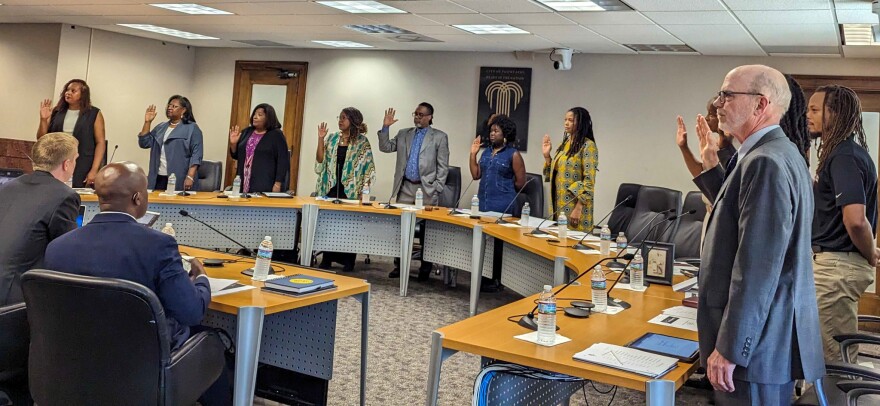Kansas City Mayor Quinton Lucas said a meeting on Tuesday afternoon at City Hall was "a historic moment for Kansas City."
In a small conference room on the 10th floor of City Hall, 15 members of the Mayor's Commission on Reparations spent two hours combing through a packed and complex agenda. Lucas had appointed the committee earlier this month to study reparations for Black Kansas Citians.
"This is something that is transformative nationally in many ways," Lucas said. "And it shows that we're trying to truly understand, first, what harms have been done in the past, and that includes by the city of Kansas City."
Consisting of mostly Black leaders from diverse backgrounds in law, public health and economics, the group discussed topics such as the history of the reparations movement, the committee's mission, and strict legal compliance with Missouri's Sunshine Law.
Lucas said this work is not to atone for what happened during slavery, but to solve problems that still affect Kansas Citians.
"Why do we see such a different life expectancy on one side of Troost versus another? And why is it so darn hard to get a loan in so many parts of our city where the majority of our population is Black? This is why we're doing this today," Lucas said of the health and economic disparities spanning Troost Ave., the city's historic racial divide.

Nearly half of the meeting consisted of a presentation by Mickey Dean, the founder of the KC Reparations Coalition, which submitted the first reparations proposal to City Council in 2020.
Dean's history of the reparations movement included explanations of the injustices incurred by Black people in the United States from 1619 to the present.
One example of discriminatory policies was the Homestead Act.
"If you read the Homestead Act you'll see it's, racially neutral on its face," Dean said. "But in reality, 99.73 percent of all of the land that was distributed under the Homestead Act went to white people, and Black people got nothing,” he said.
Dean estimated some 93 million white Americans still benefit from the Civil War-era policy that encouraged white settlers and immigrants to move West, leading to the displacement and genocide of Indigenous populations.
"This was one of the early instances of wealth building for whites in this country that Black people are not able to take advantage of," he said. "So we began to understand now, why is this tremendous wealth gap between Black and white? Because the land, of course is valuable."
Commissioners planned to establish subcommittees on specific sectors such as criminal justice and public health. They will conduct research and hire experts to assess what policies caused Black Kansas Citians the most harm.

The committee is scheduled to meet on the last Tuesday of the month for the next 18 months and present their findings and recommendations to City Council.
"It will not be within our purview to approve anything. So I think that we'll be in safe hands," said Terri Barnes, who chairs the committee and is the CEO at The Nia Project.






